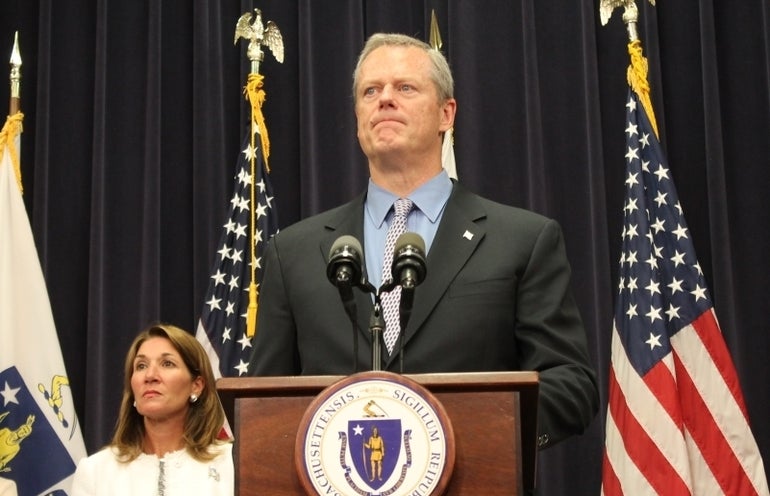Baker unsure whether he supports new employer MassHealth fees

Gov. Charlie Baker said Monday he has not yet decided whether he will sign off on $200 million in new employer fees he has linked to MassHealth reforms that the Legislature laid aside Friday as part of their budget deal.
The budget approved by the House and Senate includes a two-tiered fee structure for employers intended to help cover rising costs in the state's Medicaid program, which provides health insurance to about 1.9 million people. Rising MassHealth costs are consuming a growing share of the state budget, a problem that's especially acute in light of slow-growing state tax revenues.
The budget bill, however, did not include the public and private health insurance market reforms that Baker and his senior team have defended as integral to controlling growth within MassHealth and winning support from key stakeholders in the business and health care communities.
"We're going to keep talking," Baker said Monday.
Baker has until Monday, July 17 to make decisions on the budget, including potential vetoes or amendments he will offer to the $40.2 billion spending plan.
Baker launched debate on a new employer assessment when he proposed one back in January, but when it was met with stiff opposition from business groups he opened up talks with employers, health care providers, health plans and others about alternatives.
When crafting their budgets, the House and Senate both consented to an assessment but deferred to the administration to find a middle ground, and the fruits of those efforts were presented to the conference committee negotiating a compromise budget plan in late June.
"I haven't heard the Legislature say they're opposed to this," Baker said. "What I've heard them say is that they didn't have much of a window here to process this. I grant that, but it took us awhile to get to the point where we finished our assignment and came up with a proposal that people in both the health care community and the business community could support, so it's my hope that one way or another we'll be able to implement the package."
It may be too late for that.
The business groups that worked with the governor to develop the MassHealth reform package came out on Friday against the Legislature's decision to separate the assessments from the eligibility and benefit reforms the business groups support.
"Employers have been willing to support a temporary assessment contingent upon adoption of a larger package that includes long-term changes to the MassHealth program and vital reforms to the private insurance market. Without these reforms, the state budget and the state economy will continue to buckle under the weight of health care cost growth," read the letter that went to lawmakers as the branches were fast-gaveling votes on the budget.
Led by groups like Associated Industries of Massachusetts, the Massachusetts Business Roundtable and the Massachusetts Taxpayers Foundation, the coalition called for the "rapid approval of the reform package in its entirety by the end of July."
"On its own, the employer assessment negatively impacts thousands of businesses around the state. That impact is only acceptable as one part of a broader package that begins to address underlying health care costs," they wrote.
Baker acknowledged that position, but also said he needed more time to talk with those outside groups before making a decision on how to proceed.
"We want to be sure going forward that we don't lose that consensus and I think what we need to do at this point is have some conversations with some of the people who have been involved with this and see if we can't come up with a way to make sure that we don't lose the consensus," Baker said.
SHNS Video: Gov. Baker press availability
Asked if that meant he hadn't decided yet whether he could accept the assessments now without reforms, Baker said, "Correct."
The budget enacted by the Legislature included two new business fees that, if approved, would sunset after two years.
One assessment would boost a per-employee assessment paid by employers, and known as the Employer Medical Assistance Contribution, from $51 to $77 per year. The second would hit employers with penalties of up to $750 per employee if their workers choose MassHealth even though they have access to insurance through their employers.
Baker was able to win support from the business community for the new fees by also proposing to reform MassHealth eligibility and seeking changes to the structuring of private insurance plans.
The administration proposed to erect a "gate" blocking full-time workers with access to affordable employer-sponsored health coverage from accessing MassHealth. The package also proposed to shifts hundreds of thousands of enrollees from MassHeath to ConnectorCare plans that come with federal subsidies, but could also include greater out-of-pocket costs for patients.
"The proposed cuts by the governor would have made Massachusetts the first state to roll back the Medicaid expansion authorized under the Affordable Care Act and would have undermined the state's landmark universal coverage law," Rep. Christine Barber, a Somerville Democrat, said on the House floor Friday.
House Ways and Means Chairman Brian Dempsey, who helped craft the budget sent to Baker, said leadership didn't necessarily oppose the reforms floated by the governor, but needed more time to digest them.
"The MassHealth changes, although some were, I think, interesting in terms of the ability for us to perhaps start to look at some long-term savings, we felt it was important to hold on most of those changes and really let there be more of a public process and let that transpire," Dempsey told reporters Friday.
Rep. James Lyons, an Andover Republican, disagreed with Barber's assessment, warning the Legislature risked pushing MassHealth further from its intended mission of protecting the poor, disabled and elderly.
"I don't think we ought to be using MassHealth as a supplemental insurance plan for business, and that exactly what we're doing," Lyons said.












0 Comments